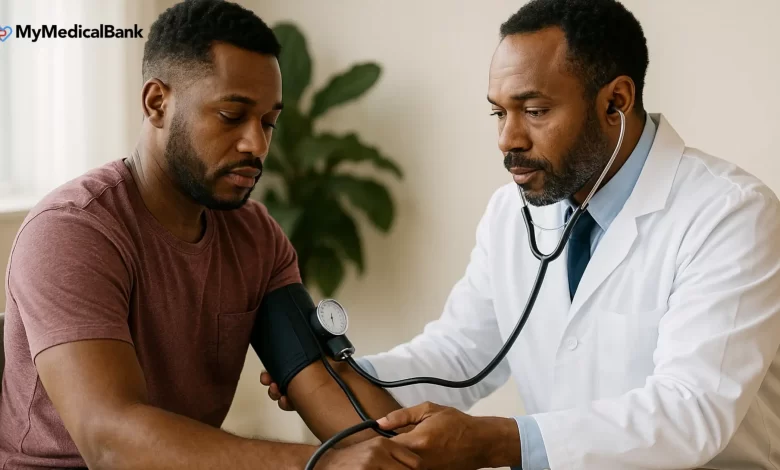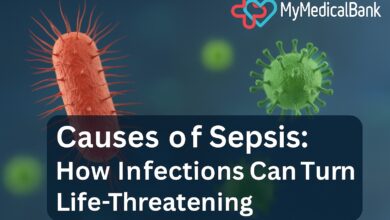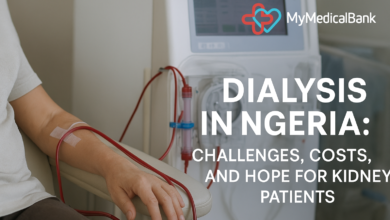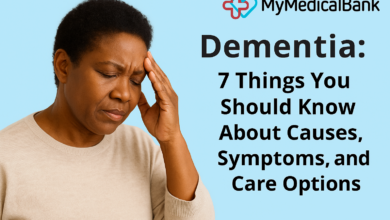Hypertension: Nigeria’s Silent Killer

Hypertension, or high blood pressure, is often called the “silent killer,” and for good reason. Many people with hypertension feel perfectly fine until a serious complication strikes. For example, one young Lagos professional, Kayode, collapsed at a dinner party and later learned his blood pressure was dangerously high, shocking him and his friends since he seemed healthy.
Unfortunately, Kayode’s story is increasingly common as hypertension quietly becomes a public health crisis in Nigeria. This article explains how hypertension is affecting Nigerians (with recent facts and figures), describes classic symptoms (and why they often go unnoticed), and offers practical tips to prevent this silent killer.
A Growing Health Crisis in Nigeria
High blood pressure is on the rise across Nigeria, affecting tens of millions of adults. Recent estimates suggest that over 35% of Nigerian adults now live with hypertension.
To put it in perspective, that’s roughly one in every three adults. In some parts of the country, prevalence rates are even higher, ranging from 22% to 44% by region. This marks a sharp increase over the past few decades. Back in 1995, only about 8.6% of adults in Nigeria had hypertension; by 2020, that figure had surged to 32.5% (around 27.5 million individuals).
The trend shows no sign of slowing, making high blood pressure one of Nigeria’s most pressing health issues. What makes hypertension especially concerning is that most affected people do not realize they have it. Nationwide studies indicate that only about 29% of hypertensive Nigerians are aware of their condition.
In other words, 7 out of 10 Nigerians with high blood pressure have no idea their blood pressure is elevated. As a result, many go untreated. Only around 12% of Nigerians with hypertension receive treatment, and a mere 2.8% have their blood pressure under control.
This huge gap between those affected and those treated is why hypertension causes so much harm under the radar. It quietly damages health for years until a sudden stroke, heart attack, or other emergency occurs. Hypertension is now a leading factor behind some of the deadliest illnesses in Nigeria. It fuels heart disease, strokes, kidney failures, and other complications. Health authorities estimate that high blood pressure and diabetes together account for about 27% of all deaths in Nigeria each year.
Why Hypertension Is Called the “Silent Killer”
One of the most dangerous aspects of hypertension is how stealthy it is. High blood pressure typically does not cause noticeable symptoms until it’s very severe. There is usually no pain and no clear warning signs for years. You can feel perfectly healthy while hypertension is quietly injuring your body. In many cases, the first sign of trouble is a life-threatening event like a heart attack or stroke.
This is why hypertension is dubbed the “silent killer”; it can be destroying your heart, brain, and arteries without you knowing. That said, there are some classic symptoms associated with extremely high blood pressure, though not everyone experiences them. These may include:
- Severe headaches or migraines, especially if they come on suddenly.
- Dizziness or blurred vision can occur when blood pressure is very high.
- Chest pain or shortness of breath, which could signal the heart is struggling.
- Nosebleeds or pounding in the chest, neck, or ears in some cases.
However, many people with hypertension have no symptoms at all. If symptoms do appear, it’s often because blood pressure has reached dangerously high levels over time. Relying on symptoms is therefore risky; by the time obvious signs occur, significant damage may have been done. The only reliable way to know if you have hypertension is to measure your blood pressure. Health experts recommend that adults get their blood pressure checked at least once a year, or more frequently if possible. This can be done at clinics, pharmacies, health fairs, or even at home with a personal blood pressure monitor.
Health Dangers of Uncontrolled Blood Pressure
1. Stroke
High blood pressure can cause blood vessels in the brain to rupture or clog more easily, leading to strokes. Strokes are a leading cause of adult disability and death in Nigeria, often striking without warning when hypertension is untreated.
2. Heart Attack and Heart Failure
Hypertension forces the heart to work much harder than normal. This can thicken and stiffen the heart muscle (a condition called left ventricular hypertrophy) and eventually lead to heart failure. It also contributes to the blockage of coronary arteries, causing heart attacks.
3. Kidney Damage
The kidneys’ tiny blood vessels can be damaged by years of high pressure, resulting in chronic kidney disease or even kidney failure. Hypertension is a top cause of kidney failure requiring dialysis.
4. Vision Loss
Elevated blood pressure may damage the blood vessels in the eyes (retinopathy), leading to vision problems or blindness in severe cases.
5. Other Complications
Uncontrolled high blood pressure is linked to dementia (from reduced blood flow to the brain), peripheral artery disease, and aneurysms (dangerous bulges in blood vessels).
Why Hypertension Is on the Rise in Nigeria
Several factors are driving Nigeria’s hypertension epidemic. As the country undergoes rapid development and lifestyle changes, risks for high blood pressure have increased. Key contributors include:
1. Urbanisation and Lifestyle Changes
Modern urban life tends to involve sedentary habits (desk jobs, less physical activity) and greater access to fast foods. Cities also bring higher stress levels from traffic, work pressures, and hustle. These changes have led to more Nigerians being overweight and physically inactive, which elevates blood pressure.
2. High-Salt Diets
Traditional diets in Nigeria were rich in fresh foods and relatively low in added salt. Today, many people consume excessive salt through processed foods, bouillon cubes, salty snacks, and restaurant meals. Surveys show some Nigerian communities have salt intakes of 7–9 grams per day, well above the WHO’s recommended maximum of 5 grams. This high sodium consumption is directly linked to the rise in hypertension in our population.
3. Poor Diet and Obesity
Along with salt, diets high in unhealthy fats and sugars contribute to weight gain and hypertension. The influx of sugary beverages, fried foods, and packaged snacks has led to more obesity, even among younger Nigerians. Obesity (especially excess belly fat) increases blood pressure by straining the heart and altering hormones.
4. Alcohol and Tobacco Use
Drinking too much alcohol and smoking cigarettes both raise blood pressure and damage blood vessels. While smoking rates in Nigeria are relatively low nationally, alcohol consumption is significant in many communities. These substances compound the risk of hypertension and its complications.
5. Genetics and Family History
People with a family history of hypertension are more prone to develop it, and studies suggest individuals of African ancestry may be genetically predisposed to higher rates of high blood pressure. This doesn’t mean hypertension is inevitable, but it means those with a family tendency should be especially proactive about prevention.
6. Limited Healthcare Access
Many Nigerians do not undergo routine medical checkups due to cost or limited access, so hypertension often goes undiagnosed until late. Health literacy is also an issue. Some people believe if you feel okay, there’s no need to see a doctor. This delays the detection and treatment of high blood pressure. Socioeconomic factors like poverty can make healthy food and regular healthcare harder to obtain.
All these factors have combined to make hypertension increasingly common even in younger adults. In the past, high blood pressure was seen mostly as an “old person’s disease.” That is no longer the case. It’s not unusual now for people in their 30s and 40s to be on blood pressure medication. As Kayode observed after his diagnosis, several of his friends in their early 30s quietly revealed they were also hypertensive and taking medication.
Practical Tips to Prevent Hypertension
1. Watch Your Salt Intake
Reducing salt in your diet is one of the quickest ways to lower blood pressure. Aim for no more than 1 teaspoon of salt per day (5 grams), including salt in cooked food and seasonings.
You can do this by cooking with natural herbs and spices instead of bouillon cubes or excess salt, avoiding extremely salty foods (like salted fish, packaged snacks, instant noodles with seasoning packets), and not adding extra salt at the table. Many Nigerians consume 7–9 grams of salt daily in some communities, which is nearly double the recommended limit. Cutting back will help your blood pressure and overall health.
2. Eat a Heart-Healthy Diet
Besides salt, pay attention to overall nutrition. Increase your intake of fruits, vegetables, beans, and whole grains, which provide potassium and other nutrients that help regulate blood pressure. Choose lean protein (fish, poultry, legumes) and healthy fats (such as nuts and olive oil) instead of diets heavy in red meat and fried foods. Try to limit sugary drinks and excessive oil.
The traditional Nigerian diet can be very healthy when centered on fresh produce like okra, leafy greens, yam, beans, etc. It’s the modern processed and fast foods high in salt, sugar, and unhealthy fats that are the culprits behind rising hypertension. By cooking at home more often and using fresh ingredients, you can better control what goes into your meals.
3. Stay Active and Maintain a Healthy Weight
Regular physical activity strengthens the heart and helps prevent high blood pressure. You don’t need a fancy gym; activities like brisk walking, jogging, cycling, or even active household chores and dancing can all count. Aim for at least 30 minutes of moderate exercise most days of the week.
Staying active also helps prevent obesity. Even losing 5-10% of your body weight (if you are overweight) can significantly reduce blood pressure. For example, if you weigh 90 kg, losing 5–9 kg through diet and exercise can make a big difference. Encourage family and friends to join you in exercise or sports; having an “exercise buddy” can keep you motivated.
4. Limit Alcohol and Avoid Smoking
Too much alcohol can raise blood pressure and damage the heart. If you drink alcoholic beverages, do so in moderation, that means no more than one drink per day for women or two per day for men as a general guideline. Excessive drinking, such as regular binge drinking, is harmful to blood pressure control.
Smoking (including cigarettes and traditional tobacco) should be avoided entirely; it causes blood pressure spikes and hardens arteries, greatly increasing the risk of heart attack and stroke. Even secondhand smoke is dangerous. Quitting smoking has immediate benefits for your blood pressure and heart health. If you need help quitting, talk to a healthcare provider about support options.
5. Manage Stress and Get Enough Rest
Chronic stress may contribute to high blood pressure by triggering hormonal responses and unhealthy habits (like stress-eating or alcohol use). While some stress is unavoidable, finding ways to manage stress is important. This could include practicing relaxation techniques (deep breathing exercises, meditation, or prayer), engaging in hobbies, or talking to someone you trust about what’s bothering you. Also, prioritize good sleep. Poor sleep and sleep disorders (like sleep apnea) can raise blood pressure over time.
6. Check Your Blood Pressure Regularly
As emphasized earlier, knowing your blood pressure numbers is key. Adults should get their BP measured at least once a year, and more often if you have risk factors or past high readings. Many pharmacies and clinics offer quick blood pressure checks. There are also affordable home blood pressure monitors available, you could consider getting one for your household and learn how to use it.
If you do monitor at home, keep a log of your readings to discuss with your doctor. Remember, hypertension often has no symptoms, so the only way to catch it early is through these checks. Community programs and health fairs are also great opportunities. For instance, during the 2024 “Know Your Numbers” campaign, millions of Nigerians got free blood pressure and diabetes tests. Take advantage of such initiatives. Early detection allows you to start lifestyle changes (or medications if needed) before serious harm occurs.
7. Follow Treatment Advice if Diagnosed
If you have been diagnosed with hypertension, it’s not the end of the road, but it does mean you need to actively manage it. Take prescribed medications as directed by your healthcare provider, even if you feel fine. Blood pressure meds work to prevent strokes and heart issues down the line, but only if taken regularly. Also, continue with all the lifestyle measures above; medications and healthy habits together will give the best protection.
Regularly follow up with your doctor or clinic to monitor your blood pressure control. The goal for most people with hypertension is to keep BP below 140/90 mmHg (or even lower if you have diabetes or kidney disease). With commitment, hypertension can be controlled, many people lead normal, active lives by keeping their blood pressure in check.
8. Embrace telemedicine for regular monitoring
With the rise of digital health tools, it’s now easier than ever to stay on top of your health from home. Telemedicine platforms like MyMedicalBank allow users to consult healthcare professionals, access their medical records, and track vital signs using the MyMedicalBank app. This digital approach supports early detection and follow-up, especially for people in remote areas or with busy schedules. Incorporating telemedicine into your routine can be a smart, proactive step in preventing and managing hypertension.
Conclusion
Hypertension may be a silent killer, but it does not have to be an inevitable fate. The fact that it often shows no symptoms is all the more reason for Nigerians to be proactive about their health. Get to know your blood pressure numbers, spread the word in your family and community, and make those small daily choices that protect your heart.



